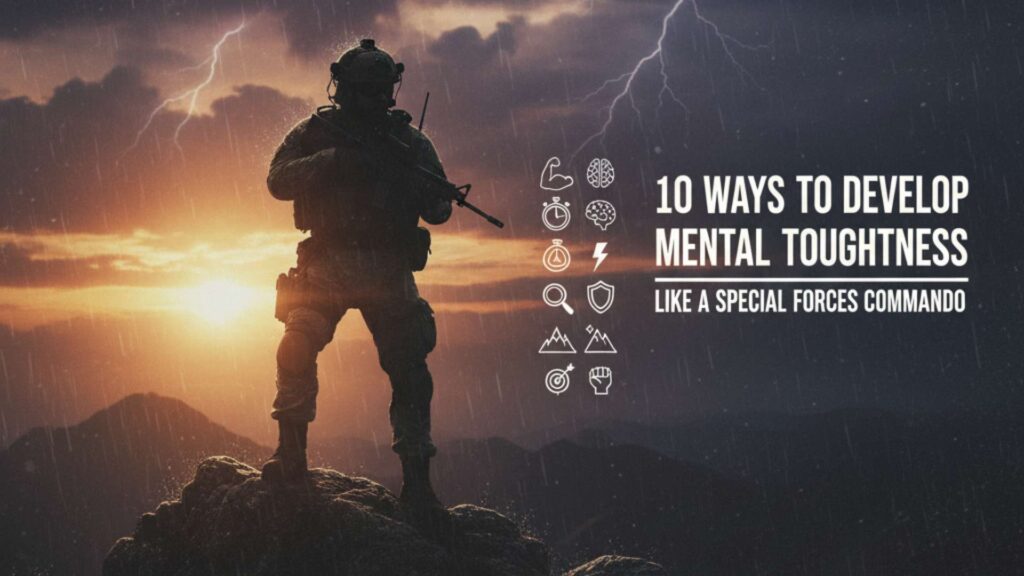10 Ways to Build Mental Toughness
Mental toughness isn’t an accident. It’s built day by day, choice by choice, through practices that strengthen your focus, grit, and recovery. You don’t need a battlefield to learn these skills; you can cultivate them in your everyday life—at work, at home, and in the quiet moments when nobody’s watching. Below are ten field-tested principles you can apply right now. Treat them like drills. Reps create resilience, and resilience compounds into unshakable confidence.
Define a Clear Mission
Special Forces train with unambiguous mission intent so every action links to purpose. Translate that to your life: write a one-sentence mission for your next 90 days. Make it specific, measurable, and emotionally compelling. Post it where you’ll see it daily. When decisions come up, ask, “Does this serve the mission?” Clarity kills hesitation, and decisiveness reduces mental drag.
This clarity is also essential for aspirants preparing for NDA Coaching in Dehradun, where focus and discipline define success.
Embrace Controlled Discomfort
Special Forces use progressive exposure to discomfort to expand their capacity under stress. Do the same with “micro-hardships”: finish your showers cold, take the stairs, present first, or work without noise-canceling headphones. Choose small frictions that are safe but challenging. Track your reps each week. Discomfort becomes data, not drama, and your nervous system learns that pressure is survivable.
Master Breathing Under Stress
Special Forces rely on deliberate breathing to steady heart rate and cognition in chaotic environments. Practice a daily protocol: inhale 4 seconds, hold 4, exhale 6–8, for 3–5 minutes. Use it before tough meetings, heavy lifts, or hard conversations. Breath is the remote control for your physiology; when you control state, you control story, and when you control story, you control action.
Build a Battle Rhythm
Special Forces operate on rhythms—brief, execute, debrief—so performance is repeatable. Create your own: morning brief (top three priorities), midday checkpoint (course-correct), evening debrief (what worked, what didn’t, what to improve tomorrow). Keep each to five minutes. Consistency beats intensity because it reduces decision fatigue and creates compounding focus across weeks and quarters.
Train the Default to Action
Special Forces cultivate an action bias rooted in planning, not impulse. Adopt “Plan-Prep-Push”: plan the smallest next step, prep the environment (open the doc, lay out the shoes), and push—start within five seconds. Momentum is a skill. The faster you move from intention to execution, the less space there is for doubt to grow.
Rehearse Failure—Then Rehearse Recovery
Special Forces conduct “what if” drills to normalize disruptions and sharpen response. List your top three likely failures for a current goal (miss a workout, procrastinate, face rejection). Pre-plan recovery scripts: what you’ll do in the first five minutes, first hour, first day. When setbacks arrive, you’ll act from protocol, not panic, turning defeats into fast feedback.
Protect the Team Inside Your Head
Special Forces are selective about who gets inside the wire—physically and mentally. Audit your inner circle: who improves your standards, who erodes them? Curate inputs—books, podcasts, mentors—that elevate your ceiling. Create a “board of advisors” list and consult it weekly. Mental toughness grows faster in strong ecosystems than in isolated willpower.
Measure What Matters, Not What’s Easy
Special Forces track indicators tied directly to mission success, not vanity metrics. Identify leading indicators for your goals: study hours logged, outreach messages sent, deep-work blocks completed. Review them every Friday and set targets for the next week. Numbers neutralize narratives; when you measure the right things, you make the right adjustments.
Practice Tactical Recovery
Special Forces treat recovery as an operational requirement, not a luxury. Schedule micro-recovery (five-minute walks, eye breaks, breath resets) and macro-recovery (sleep, sunlight, nutrition, connection). Protect boundaries: no screens one hour before bed, morning light within 60 minutes of waking, protein and hydration on a cadence. Rest isn’t quitting; it’s reloading.
Debrief Ruthlessly, Celebrate Precisely
Special Forces conduct candid debriefs where rank drops and reality speaks. Do a weekly debrief: What did I intend? What actually happened? Why? What will I do differently? Then celebrate one precise win tied to behavior (“I kept my morning brief four days”). Precision celebration trains your brain to repeat the right reps without inflating ego.
Putting It All Together
Mental toughness is the byproduct of systems that make the right behavior easier and the wrong behavior harder. Start with one principle this week—maybe the breathing protocol or the battle rhythm—and track your reps. In a month, stack another. In three months, you’ll notice your threshold for stress has climbed, your focus locks in faster, and your recovery is quicker. That’s the arc: clarity → controlled stress → controlled state → consistent execution.





























